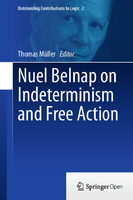Nuel Belnap on Indeterminism and Free Action
Contributor(s)
Müller, Thomas (editor)
Collection
European Research Council (ERC); Dutch Research Council (NWO); EU collectionLanguage
EnglishAbstract
In this introduction to the Outstanding contributions to logic volume devoted to Nuel Belnap’s work on indeterminism and free action, we provide a
brief overview of some of the formal frameworks and methods involved in Belnap’s
work on these topics: theories of branching histories, specifically “branching
time” and “branching space-times”, the stit (“seeing to it that”) logic of agency, and
case-intensional first order logic. We also draw some connections to the contributions
included in this volume. Abstracts of these contributions are included as an
appendix.
Nuel Belnap’s work in logic and in philosophy spans a period of over half a century.
During this time, he has followed a number of different research lines, most of them
over a period of many years or decades, and often in close collaboration with other
researchers:1 relevance logic, a long term project starting from a collaboration with
Alan Anderson dating back to the late 1950s and continued with Robert Meyer
and Michael Dunn into the 1990s; the logic of questions, developed with Thomas
Steel in the 1960s and 1970s; display logic in the 1980s and 1990s; the revision
theory of truth, with Anil Gupta, in the 1990s; and a long-term, continuing interest
in indeterminism and free action. This book is devoted to Belnap’s work on the latter
two topics. In this introduction, we provide a brief overview of some of the formal
frameworks and methods involved in thatwork, and we drawsome connections to the
contributions included in this volume. Abstracts of these contributions are presented
in Appendix A.
Keywords
logic; logic; British Summer Time; If and only if; Indeterminism; Modal logic; Nuel Belnap; SemanticsDOI
10.1007/978-3-319-01754-9ISBN
9783319017549Publisher
Springer NaturePublisher website
https://www.springernature.com/gp/products/booksPublication date and place
2014Grantor
Classification
Science: general issues


 Download
Download